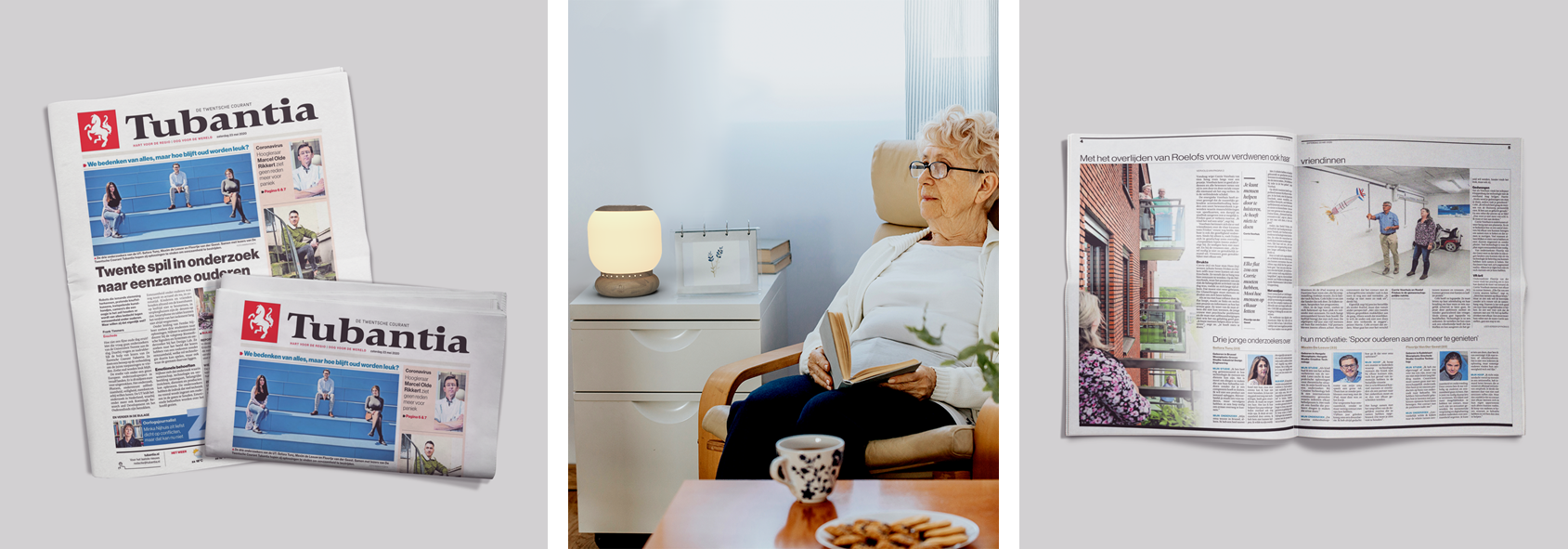
21 Oct Project Neenzaam: Co-designing with older Dutch adults remotely
Neenzaam means “no loneliness”, which is a blend of the two Dutch words “nee” and “eenzaam”. The project was initiated with the intention to invite older adults as co-designers to come up with solutions to counter loneliness. However, rather than traditional co-design sessions, it was conducted entirely remotely. We came up with the idea as a response to the restrictions caused by COVID-19, requiring us to become creative in how to involve older adults in the product design process.
Reaching older adults in times of isolation
We needed to find a way to reach older adults and explored a variety of potential communication channels, such as postcards, letters, emails, and the newspaper. It was important to be inclusive, i.e. to not only rely on online media channels, and to provide a platform for creativity. Considering a variety of aspects, such as familiarity, trustworthiness, and reach, we concluded that the newspaper was most suitable for our endeavours, resulting in a collaboration with the local newspaper: the Twentsche Courant Tubantia.
The representatives stated that the majority of readers were older adults with ca. 80,000 readers on a Saturday. A large editorial was published in the newspaper, which involved an article about local lonely older adults, and three dilemmas that summarized prior research efforts. These served as food for thought for older adults, yielding 71 valid responses to our call-to-action.
Changing the city architecture, telling stories, and exchanging pictures
Multiple older adults criticized current architectural choices and wanted more community-oriented buildings. It was proposed to divide tasks and responsibilities amongst the inhabitants, so everyone has their daily personal chores and stays active after retirement. Others demanded ways to share their stories, be it in an educational setting or with their dear ones, e.g. in form of a book. A very popular idea was to share images with each other, as it is low threshold and shows the older adults that the person is thinking about them. An extension of this idea was to have a bus with screens attached to their windows, allowing older adults to go on a trip and see new or familiar places in the comfort of their own home.
What did we learn?
After analysing the contributions, we identified five themes that can be used to counter loneliness amongst older adults: (1) continue contributing to society, (2) a support system that encourages older adults to change, (3) belong to a community that fits older adults’ interests and personality, (4) a routine to keep busy, and (5) be encouraged to be open to learning new things.
The next steps
We received 71 stories from older adults that provide us with a deep insight in their experiences with loneliness as well as their expectations on how to improve it. We want to share these stories with you and are currently working on creating an illustrated e-book. We think that sharing these stories will help gain a better understanding of how older adults experience the world, allowing us to develop better products.
Invitation to Dutch Design Week 2020
On the 22nd of October, Sefora Tunc (@yosefora), University of Twente, will be presenting Project Neenzaam at the ‘Up Close & Personal’ event at the Dutch Design Week. We were invited as our project was a strong representation of their theme ‘Silent Power’. On the one hand, we empowered older people to speak up by listening to their stories, on the other hand, we empower them to overcome loneliness through wordless communication with their loved ones.
Nomination for the Human Factors NL Thesis Award
Sefora’s thesis ‘Ibilight: Promoting social cohesion amongst older adults’ has been nominated for the Human Factors NL Thesis Award, receiving national recognition for being an excellent example of human-centred design. On the 6th of October she will pitch her thesis in front of the jury.

